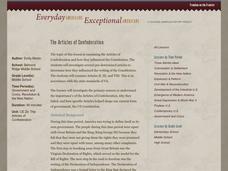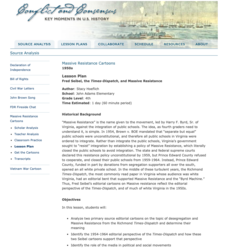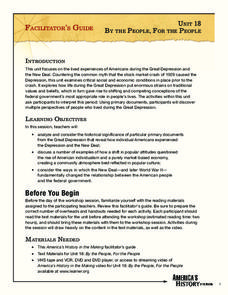US House of Representatives
Permanent Interests: The Expansion, Organization, and Rising Influence of African Americans in Congress, 1971–2007
The fourth installment of the seven-lesson unit focused on African Americans elected to and serving in the US Congress looks at the period from 1971 through 2007. Class members read a contextual essay that provides background information...
US House of Representatives
Black Americans in Congress Speak Their Mind
To conclude their study of Black Americans in Congress, groups select a statement made by one of the Members, examine the Member's profile on the provided link, and create a display that includes state represented, years of service, an...
Center for Civic Education
Constitution Day Rap
Engage your class while learning about the US Constitution with this fun primary grade social studies lesson. After viewing a picture of the US Constitution, young learners piece together a US flag using stars and stripes with facts...
Alabama Department of Archives and History
Conflict in Alabama in the 1830s: Native Americans, Settlers, and Government
To better understand the Indian Removal Act of 1830, class members examine primary source documents including letters written by Alabama governors and the Cherokee chiefs. The lesson is part of a unit on the expansion of the United...
Roy Rosenzweig Center for History and New Media
The Articles of Confederation
Have you ever started a project only to realize you need to scrap it and start over? Scholars analyze the issues leading to the fall of the Articles of Confederation. A group investigation into Articles II, III, and VIII unveil the...
American Institute of Physics
African American Inventors in History
A two-part lesson plan introduces young historians to the work of famous African American inventors. Groups first research and develop a presentation of an inventor that includes biographical information and information about one of...
Roy Rosenzweig Center for History and New Media
Fred Seibel, the Times-Dispatch, and Massive Resistance
A lesson challenges scholars to analyze editorial cartoons created by Fred Seibel, illustrator for the Times-Dispatch, during the Massive Resistance. A class discussion looking at today's editorial pages and Jim Crow Laws leads the way...
Stanford University
Ansel Adams at Manzanar
Analyzing photos from Ansel Adams of Manzanar—a camp where the American government imprisoned thousands of Japanese-Americans during World War II—individuals consider what images have to say about this period in American history....
A&E Television
Documenting Democracy: Lesson Plans on the United States Constitution
Balance and compromise. Class members come to understand the importance of these concepts as they investigate the concerns of the various stakeholders and how the format of the Constitution addressed these concerns.
National Constitution Center
Separation of Powers
Learners explore how the Constitution provides for separation of power and limited government, as evidenced by the three branches of government. They participate in role-playing situations, group discussions, and complete worksheets to...
iCivics
Wanted: A Just Right Government
What type of government did American colonists gain and seek after gaining their independence after the Revolutionary War? Here is lesson that will guide your young learners through the new nation's progression from the Articles of...
City University of New York
African Americans and the Populist Movement
Why did the Populist Party fail to ally itself with African American farmers? To answer this essential question, class members investigate the Populist Era (188-1900) and read an article written by Tom Watson, a Populist leader.
Alabama Department of Archives and History
World War II Home Front - Mobilization in Alabama
Ships, tanks, and planes—what does a military need to fight a war? An interesting instructional activity explains the government's military mobilization efforts in Alabama during WWII. Class members look at a PowerPoint presentation and...
Teaching Tolerance
Mass Incarceration as a Form of Racialized Social Control
Mass incarceration: A result of a tough stance on crime or racial discrimination, you decide. Academics explore the history and reasons behind mass incarcerations in the United States and its impact on ethnic communities. The...
US House of Representatives
A Picture is Worth a Thousand Words
Groups select a photograph from one of the four eras of African Americans in Congress and develop a five-minute presentation that provides background information about the image as well as its historical significance. The class compares...
Historical Thinking Matters
Social Security: 1 Day Lesson
Should the United States provide relief for those who are unemployed? Trace this question back to the Great Depression with your young historians, who will engage in careful reading of historical documents and classroom discussion to...
National Endowment for the Humanities
Martin Luther King, Jr. and Nonviolent Resistance
Was nonviolent resistance the best means of securing civil rights for black Americans in the 1960s? In this highly engaging and informative lesson, your young historians will closely analyze several key documents from the civil rights...
K20 LEARN
Worcester v. Georgia: Cherokee Sovereignty and Actions of the U.S. Government
Young historians study the Supreme Court case "Worcester v. Georgia" and note instances where the Justices defended the sovereign rights of the Cherokee. They also examine the actions of President Andrew Jackson and the provisions of...
Caucus 101
Linkage Institutions: Interest Groups: Option A
How are elections really run and won? Learn about special interest groups, super PACs, and lobbyists with an engaging lesson plan about the caucus process. Young voters research specific interest groups and analyze their part in previous...
Judicial Learning Center
The Judge and the Jury
Unless you are a lawyer, you might not understand just how unrealistic Law and Order and other legal dramas actually are. Here's a great resource to help scholars of criminology gain a more realistic perspective. The lesson outlines the...
Annenberg Foundation
By the People, For the People
A picture speaks a thousand words—no matter how old. The 18th installment of a 22-part series on the making of American history has scholars research the causes of the Great Depression and the factors of the New Deal. Using photographic...
Curated OER
What is the Federal System Created by the Constitution?
Explore the unique structure of the federal system of government in the United States. Class members will learn about how most nations were organized before the establishment of the Constitution, how power is currently divided between...
National Endowment for the Humanities
Revolution '67, Lesson 1: Protest: Why and How
To some people, protesting is as American as apple pie, but the factors that lead to protests can be as confusing to veteran activists as to today's youth. Revolution '67 explores the riots in Newark, New Jersey as a case study. Using...
Pace University
Jacksonian Democracy
Jacksonian Democracy ... a total success or a complete failure? Young academics examine Jacksonian Democracy, including the concept of the supremacy of the federal government and the forced relocation of Native Americans. Scholars...

























